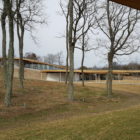Government
Grace Farms Seeks Changes in Re-Filed P&Z Application; Neighbor’s ‘Conflict of Interest’ Claim Targets Chairman
|
As its resubmitted application goes before the Planning & Zoning Commission this week, Grace Farms is seeking to redefine parts of the town’s approval in ways that would allow for more people than the town body had envisioned on its vast campus. A key piece of P&Z’s heavily conditioned September approval calls for Grace Farms to limit how many times it may have large numbers of people on its site—for example, one condition specifies that it may have 500 to 1,200 people on the site no more than six days per year. In a proposed rewrite of those conditions, Grace Farms is seeking to apply those limits to guests at specific events, rather than total people on site. As such, those visiting Grace Farms for reasons not tied to the events—for example, to walk the property, view its celebrated River Building, eat lunch in its cafeteria, work in the library or sip tea—would not count toward the limit. The changes would “clarify” that P&Z’s limits apply “to identified/planned events, as intended, and not to non-event daily usage by church or Foundation staff, or general public visits, which are monitored by the availability of parking on site,” according to Grace Farms’s proposed changes.


